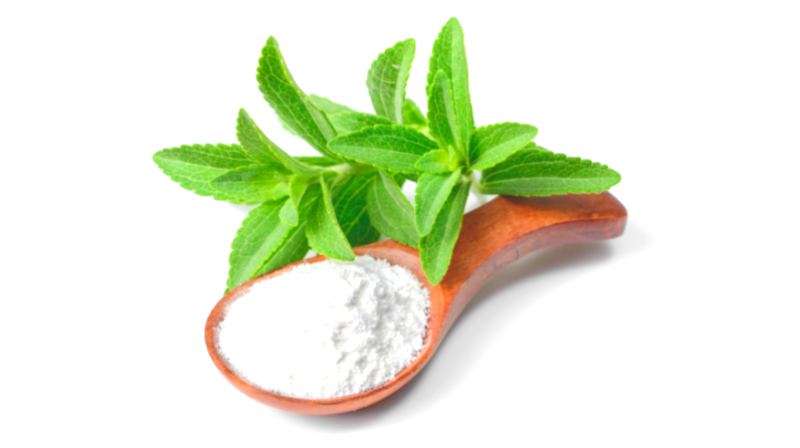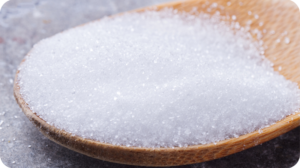Refined sugar is one of the unhealthiest ingredients in the modern American diet. Abundant evidence has shown a link between white sugar and serious diseases from diabetes to cancer. Sugar’s prevalence in a vast array of processed foods—even surprising products like canned soups—has also contributed to America’s epidemic of obesity.

That should come as no surprise. We are wired to love sweetness. Our prehistoric ancestors combed the wilds for berries and other fruits, to enjoy the pleasurable flavors and slight rush of the fructose. Those treasures were seasonal and hard to locate, so they were eaten as a small part of the prehistoric diet. Nowadays, you don’t have to look far to find sugar-rich foodstuffs. In fact, it’s much harder to find food that doesn’t contain added sugar.
As the evidence against refined sugar has mounted, more and more people are sweetening their coffee and even baking with sugar replacements. The first widely available sweetener alternatives were synthetic versions like Aspartame. Over time, researchers found that those options had their own unhealthy effects.
So, in the never-ending search to satisfy sweet cravings in as healthy a way as possible, American consumers have turned to a range of more or less “natural” sweeteners. Each has its own pros and cons, but there are now several widely available (if slightly expensive), healthier sugar alternatives on the market.
The Replacements
The information that follows is perhaps most relevant for label readers. It’s still nearly impossible to find one substitute that neatly replaces the baked goods behavior and flavor of refined white sugar. However, all of these are better for critical blood sugar levels than refined sugar. The Glycemic Index represents, on a scale of 1 to 100, the impact a foodstuff has on blood sugar and insulin levels. Refined white sugar has a predictably high GI of 65. Each of the options below, except for xylitol, have a GI of 0.
- Stevia. Made from a plant leaf, Stevia is completely natural and contains no calories or carbohydrates. It is hundreds of times sweeter than refined sugar, so much less is used. The downside is Stevia’s flavor. It’s nearly impossible to dial back Stevia’s aggressive sweetness to a level closer to refined sugar, and that makes Stevia difficult to use in baked goods. It is, however, used in many processed “sugar-free” candies and treats. Many people experience a bitter or chemical aftertaste with Stevia, regardless of the amount used, but it has no other appreciable side effects. Only buy refined powdered or liquid extract, not whole leaves or crude extract—the possible health effects of the latter are not known.
- Erythritol. New, headline-grabbing research has indicated that this sugar alcohol may carry a risk of stroke or heart attack in individuals with heart disease. However, only one study has been published with these results and the conclusions are further complicated by the fact that the body produces its own erythritol. That means it’s difficult to determine if the culprit erythritol is ingested or produced by the body itself. Prior researcher has shown the sweetener to be an antioxidant and even a boost to oral health. This sweetener is not only widespread in raw form, it is also the basis for many sugar-free options on the retail shelf because it can be used almost one-for-one in place of refined sugar. In either case, erythritol is about three-quarters as sweet as white sugar, and can cause digestive issues for some people when eaten in large enough quantities. Some people also find it has a slight chemical aftertaste.
- Allulose. This sweetener is called a “rare sugar” because it can only be derived from a small number of foods, such as figs. It is about half as sweet as refined sugar. It has less than 1 calorie per teaspoon and acts more like sugar when heated or used in baking, than any other sweetener on this list. You can even make caramel with allulose. Preliminary research indicates that allulose may have anti-inflammatory, anti-carcinogenic, and fat-burning properties. However, the small amounts normally consumed likely limit the extent of these benefits.
- Monk fruit sweetener. Extracted from the exotic monk fruit, this sweetener has no calories and is nearly twice as sweet as refined sugar with no noticeable aftertaste. Because of the sweetness, it is usually sold in a blend with erythritol. Although little research has been done on monk fruit sweetener, preliminary findings suggest it may have anti-inflammatory, antioxidant, and anti-carcinogenic properties.
- Xylitol. This sugar alcohol is considered close to sugar in sweetness with about half the calories. It is often processed from birch trees, and is considered a natural sugar alternative. It’s common in sugar-free gums, candies, and other treats. It is the only sweetener on this list with a Glycemic Index above 0, at a still-modest 7. It has been found to fight ear and yeast infections, and may cause digestive issues (most commonly gas and diarrhea) when consumed in large quantities.
Be aware that all these sweeteners cost significantly more than refined sugar. However, given the decreased impact on blood sugar and low calorie count of these options, the extra expense is a wise investment in preventing weight gain, diabetes, and other health issues. For more about natural sugar alternatives, check out the American Diabetes Associations website.





